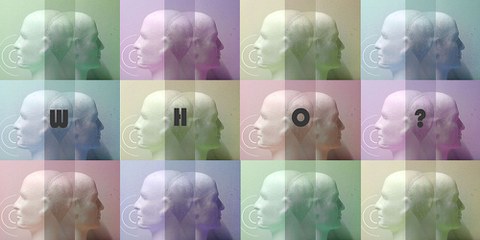Phonagnosia
How does it feel to be phonagnosic?
Are you interested in phonagnosia?
Voice recognition - Online-Test
How well do you recognise familiar voices? Test your voice recognition abilities in just 20 minutes. Everything you need are headphones or speakers and a quiet environment.
Click here to start the test.
What is phonagnosia?
The word phonagnosia is of Greek origin: “Agnosia” means “not-knowing” and “Phon” means “voice”. Individuals with phonagnosia have difficulties to recognise familiar people by their voices.
What causes phonagnosia?
To date, phonagnosia is not well understood. Until recently, cases of phonagnosia were only known as a result of brain damage, i.e., after stroke – this type is called acquired phonagnosia. However, there is also an inborn type of phonagnosia – developmental phonagnosia.
The otherwise completely healthy individuals experience only deficits in voice recognition. In contrast, they do well in discriminating male and female voices or in understanding what a speaker has said. They are also good in perceiving the emotional state of the voice, i.e., whether a speaker is sad or happy. Additionally, they are good in recognising a person using facial information or the name.
The cause of developmental phonagnosia is not investigated yet, but is assumed to be genetic.
How does it feel to be phonagnosic?
Imagine someone calls you on the phone and you did not see the caller’s name on the mobile display. Although the caller seems to know you very well you are not able to identify him. Only after a while you recognise that the caller is your own son.
So far, there are three documented case descriptions about individuals having inborn deficits in voice recognition. In 2009, there was a first report about a 60-year-old management consultant with inborn voice-recognition difficulties. She reported having difficulties to identify her own daughter on the telephone. However, she also had difficulties in speech perception. Recently, scientists in the lab of Katharina von Kriegstein were able to identify two individuals with phonagnosia by means of the online-test, and studied their behavioural pattern in detail.
“AS”, a 32-year-old post-graduate, and “SP”, a 32-year-old PhD student, both report having lifelong voice-recognition difficulties. For example, AS fails to recognise her daughter’s voice when she is playing with a friend in another room. SP first became aware of his voice-recognition difficulties while watching television. Unlike a friend, he failed to notice when a voice actor in his favourite dubbed television series changed. Interestingly, individuals with phonagnosia report to use different strategies and tricks to compensate for their perceptual deficit. For example, during a telephone call they pay attention whether the caller has a dialect or uses specific idioms (e.g., says typically “Hi” instead of “Hello”). Also, an individual laughter can reveal the caller’s identity. However, despite these compensatory strategies, there will always be situations in which phonagnosics feel embarrassed because of the voice recognition difficulties.
It is a tremendous help for individuals with phonagnosia to know that phonagnosia exists and is being investigated. For this reason, it is important to bring phonagnosia to more public attention.
Are you interested in phonagnosia?
We are looking forward to receive your Email: phonagnosie@tu-dresden.de
Literature
1. Roswandowitz, C., Mathias, S. R., Hintz, F., Kreitewolf, J., Schelinski, S., & von Kriegstein, K. (2014). Two cases of selective developmental voice-recognition impairments. Curr Biol, 24(19), 2348-2353. doi:10.1016/j.cub.2014.08.048
2. Roswandowitz, C., Schelinski, S., & von Kriegstein, K. (2017). Developmental phonagnosia: Linking neural mechanisms with the behavioural phenotype. Neuroimage, 155, 97-112. doi:10.1016/j.neuroimage.2017.02.064
3. Garrido, L., Eisner, F., McGettigan, C., Stewart, L., Sauter, D., Hanley, J. R., Schweinberger, S. R., Warren, J. D., & Duchaine, B. (2009). Developmental phonagnosia: a selective deficit of vocal identity recognition. Neuropsychologia, 47(1), 123-131. doi:10.1016/j.neuropsychologia.2008.08.003

